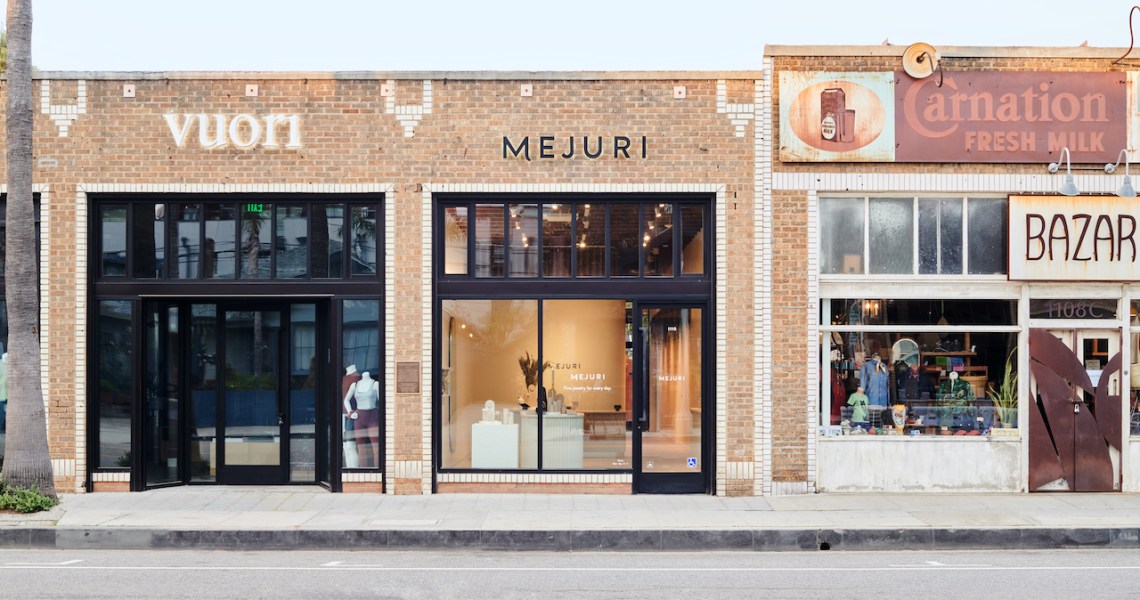The Canadian jewelry brand Mejuri is midway through a growth spurt, with new stores, a new mobile app and a new loyalty membership program all aimed at speeding the direct-to-consumer brand’s growth.
Mejuri has raised more than $100 million in funding to date from investors including Felix Capital. That money has so far gone into hiring — the company has nearly 600 employees, over 70% of whom are women — and opening new stores. Mejuri operates 24 stores across the U.S., Canada and the U.K., and plans to reach 29 stores by the end of the year.
In addition, a new mobile app launched on Thursday brings personalized shopping to the brand’s e-commerce ecosystem. Mejuri co-founder Majed Masad said he’s wanted to introduce a mobile app since the brand’s launch in 2013, but development was deprioritized as the brand focused on e-commerce and brick-and-mortar retail.
“We wanted to do it right,” Masad said. “We didn’t want to just replicate the website, because that wouldn’t add value. Personalization by recommending items that go well with what people have bought is what sets the app apart from our online store.” The personalization feature is not offered on the brand’s website.
The app is also meant to target Mejuri’s most loyal buyers. The brand has around 2 million annual customers, but 50% of its revenue comes from repeat customers. Of those repeat buyers, 25% buy multiple items from Mejuri in a single year. The app is designed for loyal customers who shop Mejuri regularly and will benefit from the recommendations and personalization that adjust based on what they’ve purchased and how frequently. When customers have bought a certain product, for example, the next time they log into the app, they’ll be served front-page recommendations for products that pair well with their original purpose.
Mejuri is not yet profitable, but Masad said the brand is progressing toward profitability every quarter.
Mejuri’s new loyalty membership program, also launched Thursday, has a similar goal of increasing customer lifetime value. The program’s creation was led by Elaine Shum, the company’s vp of insight and design, who spent months speaking directly with Mejuri customers about what they wanted out of a loyalty program. They landed on elements like discounts, gifts on customers’ birthdays and exclusive products for members. More features will be added to the program based on feedback collected from users in the first few months of its life.
Ad position: web_incontent_pos1
“Customers don’t always know what they want or what they’ll engage with, even when you ask them,” Masad said. “You have to take a bet and then you learn if it really works.”
Finally, Mejuri is planning for even more store openings next year, with a particular eye on international expansion outside of the three markets where it already has stores. Masad called out Europe and Australia as potential areas of further investment.
“There’s a strong opportunity for us to expand internationally,” Masad said. “If what we’re doing works in the U.S. or the U.K., there’s no reason it can’t work in Germany, too.”
He said the brand has minimized risk in the physical retail space by only opening in areas where there’s demonstrated demand for the brand from online sales. Areas with particularly strong demand, like New York City, already have multiple Mejuri stores.
Mejuri is still a 100% DTC brand. Recently, a number of DTC-native brands have begun to experiment with wholesale, citing the increased cost of digital customer acquisition as a reason to work with retailers. But Kristin Naragon, chief strategy and marketing officer at Akeneo, a retail tech provider that works with both wholesale and DTC brands, said both channels are still viable in the current market.
Ad position: web_incontent_pos2
“I don’t see a lasting trend in either direction,” she said. “The trend that I see is that customers expect to have readily available, consistent, and engaging information about the products that they are interested in and ultimately purchase. The trend is that consumers don’t want to be disappointed.”
Masad didn’t rule out wholesale partnerships for Mejuri in the future, though he said he is cautious about approaching the wholesale sector.
“It’s tempting to take the wholesale deal,” he said. “Early on, we had a small wholesale partnership with a retailer, and we really didn’t like the way they displayed the brand. We’ve been DTC ever since, and I want to keep it that way. But I am open to a strategic partnership with the right partner, especially if it’s for a good reason like helping us get into a new geographic market that we’ve never been in before.”




